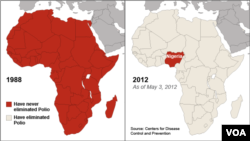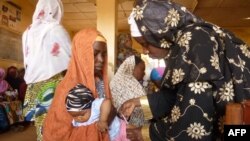ABUJA —
Nigeria is one of just a few countries where children are still at risk of paralysis or death from polio. The government and aid organizations are working furiously to vaccinate as many children as possible. But as World Polio Day arrives this Friday, the country's worst-hit regions remain inaccessible to health care workers, and adult victims find little relief from crushing poverty.
At this busy street corner in the Nigerian capital, 20-year-old Mohammad moves from car to car, putting his hand out for money. His legs are shrunken and useless, so he sits on his homemade wooden skateboard and pushes himself through traffic with his hands.
He wears flip-flops on his hands to protect them as he lifts himself onto the curb.
Mohammad says he was four when he fell sick and lost the use of his legs. By fourteen, his family couldn’t support him anymore, so he moved from northern Nigeria to the capital. He’s never been to a doctor and he’s never heard of polio.
But health officials here say young men like Mohammad, who can be found on street corners across the country, are nearly all victims of polio -- a sometimes fatal but preventable disease that was wiped out in the Western hemisphere in the 1990s.
Nigeria has come a long way against polio since Mohammad was a child and the country has had only 49 cases so far this year --- half the number from the same period in 2012.
However, Kemi Lawanson, the national program coordinator for Rotary International PolioPlus in Nigeria, says for any victim, the disease is devastating.
“When a child has polio and it is actually detected, or if it’s not detected early -- by the time the polio virus hits the child, especially under five… it cripples the child. And it’s a lifelong crippling effect," said Lawanson.
The Nigerian government and a host of aid organizations are trying to vaccinate as many children as possible. But Lawanson says sometimes, convincing parents that a vaccination will protect children is difficult.
“In some parts of the endemic states, there is this strong belief that the polio vaccine, the oral polio vaccine causes infertility in their girls," said Lawanson. "As a result of which they don’t want to go for it. They worry it’s a risk to them."
The ‘endemic states’ Lawanson mentions are all in the north, where insurgents have terrorized the population since 2009.
Early this year, nine polio vaccinators were slaughtered in the northern state of Kano. The Global Polio Eradication Initiative says vaccinators have no access to children in Borno state, the heart of the insurgency.
Last year, the only countries to report polio cases were Nigeria, Afghanistan, Pakistan and Chad, but so far this year, there have been victims in four other countries.
The hardest hit is Somalia, with more than half of the world’s 296 cases reported this year.
Despite that nearly doubling of polio cases worldwide, Lawanson says Nigeria is still on track to eradicate the disease from the country by 2015. She said aid workers are working with local leaders to encourage vaccination and meeting refugees as they flee dangerous but inaccessible areas.
But Mohammad said for him and his friend Jamilu, another victim, no help is available. In fact, Jamilu said, if someone offered him an operation to fix his legs, he would decline.
Jamilu said if someone gave him money he wouldn’t use it to pay for a doctor, but to open a shop to sell incense and other accessories.
Mohammad and Jamilu said they didn’t know that major aid organizations are pouring billions of dollars into eradication efforts to prevent other children from suffering their fate.
But if they are giving money away, Jamilu said, for only about $1,000 he could open a shop and stop begging on the streets.
At this busy street corner in the Nigerian capital, 20-year-old Mohammad moves from car to car, putting his hand out for money. His legs are shrunken and useless, so he sits on his homemade wooden skateboard and pushes himself through traffic with his hands.
He wears flip-flops on his hands to protect them as he lifts himself onto the curb.
Mohammad says he was four when he fell sick and lost the use of his legs. By fourteen, his family couldn’t support him anymore, so he moved from northern Nigeria to the capital. He’s never been to a doctor and he’s never heard of polio.
But health officials here say young men like Mohammad, who can be found on street corners across the country, are nearly all victims of polio -- a sometimes fatal but preventable disease that was wiped out in the Western hemisphere in the 1990s.
Nigeria has come a long way against polio since Mohammad was a child and the country has had only 49 cases so far this year --- half the number from the same period in 2012.
However, Kemi Lawanson, the national program coordinator for Rotary International PolioPlus in Nigeria, says for any victim, the disease is devastating.
“When a child has polio and it is actually detected, or if it’s not detected early -- by the time the polio virus hits the child, especially under five… it cripples the child. And it’s a lifelong crippling effect," said Lawanson.
The Nigerian government and a host of aid organizations are trying to vaccinate as many children as possible. But Lawanson says sometimes, convincing parents that a vaccination will protect children is difficult.
“In some parts of the endemic states, there is this strong belief that the polio vaccine, the oral polio vaccine causes infertility in their girls," said Lawanson. "As a result of which they don’t want to go for it. They worry it’s a risk to them."
The ‘endemic states’ Lawanson mentions are all in the north, where insurgents have terrorized the population since 2009.
Early this year, nine polio vaccinators were slaughtered in the northern state of Kano. The Global Polio Eradication Initiative says vaccinators have no access to children in Borno state, the heart of the insurgency.
Last year, the only countries to report polio cases were Nigeria, Afghanistan, Pakistan and Chad, but so far this year, there have been victims in four other countries.
The hardest hit is Somalia, with more than half of the world’s 296 cases reported this year.
Despite that nearly doubling of polio cases worldwide, Lawanson says Nigeria is still on track to eradicate the disease from the country by 2015. She said aid workers are working with local leaders to encourage vaccination and meeting refugees as they flee dangerous but inaccessible areas.
But Mohammad said for him and his friend Jamilu, another victim, no help is available. In fact, Jamilu said, if someone offered him an operation to fix his legs, he would decline.
Jamilu said if someone gave him money he wouldn’t use it to pay for a doctor, but to open a shop to sell incense and other accessories.
Mohammad and Jamilu said they didn’t know that major aid organizations are pouring billions of dollars into eradication efforts to prevent other children from suffering their fate.
But if they are giving money away, Jamilu said, for only about $1,000 he could open a shop and stop begging on the streets.






